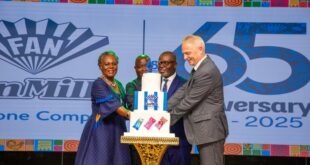Subject: Leveraging Ghana’s Regional Resource Endowments for Youth Employment and Inclusive Economic Development
Dear Honorable Minister,
I write to you with deep concern, yet great hope, about the future of Ghana’s economic development, particularly the role your Ministry can play in tackling the growing challenge of youth unemployment through strategic investments in trade, agribusiness, and industry that are tailored to the unique strengths of our regions.
Ghana’s youth, particularly those in urban, peri-urban, and rural communities are the backbone of our nation’s future. Yet, thousands of them, including graduates from senior high schools and tertiary institutions, remain unemployed or underemployed.
Rising Youth Unemployment and NEET Crisis
Recent data from the Ghana Statistical Service (GSS) reveals a deepening crisis in youth unemployment and education-to-employment transition. In the first three quarters of 2023, the national unemployment rate averaged 14.7%, with youth aged 15 to 35 particularly affected. The number of unemployed youth rose from approximately 1.2 million to over 1.3 million.
Notably, young women continue to face significantly higher unemployment rates than men, underscoring persistent gender inequalities in access to economic opportunities. Compounding the issue, 25% of young people, an estimated 2.5 million were classified as NEET (Not in Employment, Education, or Training) throughout 2022, highlighting systemic challenges in preparing and linking youth to the labor market.
Vulnerable Employment and Gender Inequality
The structure of employment in Ghana further exacerbates economic vulnerability. Two-thirds of employed individuals are engaged in vulnerable employment, marked by job insecurity, limited benefits, and inconsistent income. Disparities are sharp between urban (56.4%) and rural (80%) populations. This rural-urban divide reflects broader structural inequalities in access to formal employment and sustainable livelihoods. Meanwhile, gender inequality remains stark: in the first quarter of 2022, the unadjusted gender pay gap was 37.3%, with men earning an average of ¢11.00 per hour compared to ¢6.90 for women, a clear indicator of wage discrimination and occupational segregation.
Persistent and Long-Term Unemployment
Adding to the complexity is the issue of long-term unemployment. Approximately 390,000 individuals aged 15 and older who were unemployed in the first quarter of 2022 remained unemployed into the second quarter, signaling continued labor market exclusion for a significant portion of the population. These interrelated challenges, youth unemployment, vulnerable employment, gender pay gaps, and long-term joblessness call for urgent, inclusive, and evidence-driven labor market reforms. Targeted interventions are needed to promote decent work, bridge skills gaps, reduce gender disparities, and create resilient employment pathways, especially for youth and underserved rural communities.
The above unemployment situation is not due to a lack of potential, but rather a mismatch between available opportunities and the untapped wealth of regional resources that, if well harnessed, could drive job creation, entrepreneurship, and inclusive development.
Harnessing Regional Resource Endowments for Inclusive Industrialization and Job Creation
Ghana is richly endowed with a wide range of natural, agricultural, and mineral resources distributed across all sixteen regions. These resources offer significant potential for economic transformation, especially when harnessed through targeted industrialization strategies that align with the specific strengths of each region.
For instance, the Bono and Bono East Regions are among the leading producers of cashew, a high-value export crop with vast processing and value addition opportunities. The Northern, Upper West, and Upper East Regions produce substantial quantities of rice and Shea, commodities that can be scaled through improved processing infrastructure, packaging industries, and export channels. The Central and Western Regions have abundant oil palm plantations that, if fully industrialized, could support cosmetics, biofuel, and food processing industries.
Meanwhile, the Ashanti and Eastern Regions remain central to Ghana’s cocoa economy, with the potential to expand local processing and chocolate manufacturing for both domestic and international markets. The Volta Region and coastal belts, rich in fisheries and aquaculture resources, present a strong opportunity for fish processing, cold chain logistics, and export-based fisheries management.
Furthermore, the Savannah and Oti Regions offer fertile grounds for horticulture, yam, maize, and tuber cultivation, which can drive local agribusiness and food security initiatives. Even the Greater Accra Region, despite its urbanization, can lead in logistics, warehousing, and support industries that connect rural production to national and international markets.
Each of these regions holds a comparative economic advantage that, if industrialized with youth-focused investments, can transform the employment landscape. By promoting region-specific industrial hubs, youth cooperatives, agritech innovation centers, and export zones, the government can activate a new wave of inclusive and decentralized economic growth powered by the unique potential of each region and driven by the energy and creativity of Ghana’s youth.
Suggested solutions
Honorable Minister, I respectfully suggest the following strategic actions:
- Regional Agribusiness and Industrial Parks
- Establish youth-focused agribusiness and light industrial parks in each region based on local resource strengths.
- These parks can serve as hubs for training, processing, packaging, and marketing, offering shared infrastructure for startups and cooperatives.
2. Decentralized Youth Enterprise Funds Linked to Local Value Chains
- Develop a region-based financing mechanism where youth-led businesses in agriculture and manufacturing can access capital tied to viable local industries (e.g., cashew, poultry, gari processing, etc.).
3. Revitalization of TVET with Regional Focus
- Align Technical and Vocational Education and Training (TVET) curricula with the dominant agribusiness and trade sectors in each region.
- Emphasize field-based training and business incubation for senior high and tertiary graduates.
4. Youth Agribusiness Cooperatives
- Support the formation and scaling of youth agribusiness cooperatives with access to land, inputs, and off-taker agreements.
- Use cooperatives to build collective bargaining power and drive community-level economic transformation.
5. Regional Export Hubs and Trade Facilitation Centers
- Position each region as a specialized export hub based on its production strength, and work with development partners to train youth in export standards, packaging, and logistics.
- This can help link local production to AfCFTA and other international markets.
6. Public-Private-Community Partnerships (PPCPs)
- Incentivize private sector investment in rural and peri-urban areas through tax breaks and public co-investment, while integrating local youth as employees, producers, or suppliers.
7. Mentorship, Innovation, and Market Linkages
- Partner regional innovation hubs that link youth to mentorship, markets, and digital tools (where feasible), ensuring young entrepreneurs are not only trained but also sustained in the long term.
Honorable Minister, Ghana’s regions are not liabilities—they are economic powerhouses waiting to be activated. If we tailor our trade, agribusiness, and industrial policy to the natural and human capital of each region, we will not only reduce youth unemployment but also build a more inclusive and sustainable economy for all.
I am confident that under your leadership, and with a strategic, region-based approach, Ghana can become a continental leader in inclusive industrial transformation driven by its youth.
With sincere hope and partnership,
Yours faithfully,
George Antwi-Boasiako (BA, MSc, MSc)
Director of Finance, Ghana Hubs Network
CEO, Startups Cooperative Credit Union
CEO, Agrico Hub, Techiman
Email: gkantwi12@gmail.com
Tell: 0244 016 046
Source: Ghanaweb.mobi
 Home Of Ghana News Ghana News, Entertainment And More
Home Of Ghana News Ghana News, Entertainment And More




